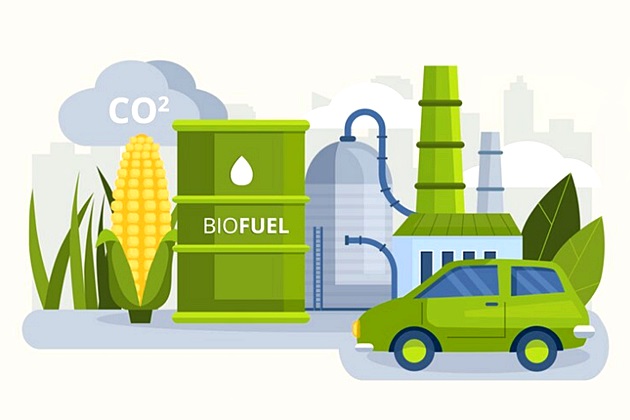896

The European Union (EU) has allocated 430 million euros, mainly for research in the field, in an effort to promote biofuels. However, the report published by the European Court of Auditors emphasizes that the implementation of advanced biofuels is slower than anticipated and that the EU's biofuel policy lacks a long-term vision.
Biofuels are seen as an alternative to fossil fuels, with their goal being to contribute to reducing greenhouse gas emissions in the transport sector and improve the EU's energy security.
During the period 2014-2020, the EU allocated about 430 million euros for research projects and the promotion of biofuels. However, the transition from initial laboratory research to the production phase takes at least a decade. Additionally, EU policies, legislation, and priorities regarding biofuels have often changed, making the sector less attractive and impacting investor decisions.
"Biofuels are meant to contribute to the EU's climate neutrality goals and enhance its energy sovereignty. However, with its current biofuel policy, the EU is not heading in a clear direction and risks not reaching its destination," said Nikolaos Milionis, the Court member responsible for this audit.
The lack of a clear direction is a particularly highlighted issue by auditors. Take, for example, the aviation sector.
Given that this sector is challenging to electrify, advanced biofuels could be a good option for decarbonization. The new ReFuelEU aviation legislation adopted in 2023 has set a target level of 6% for sustainable aviation fuels, including biofuels, by 2030 – approximately 2.76 million tonnes of oil equivalent.
However, the current production capacity of the EU barely reaches a tenth of this quantity. Also, unlike the United States, there is still no EU roadmap showing how to accelerate production.
The future of biofuels in road transport is also highly uncertain. The strong focus on electric vehicles, combined with the plan to stop selling new petrol and diesel cars by 2035, could mean that biofuels will not see widespread use in EU road transport in the future.
Auditors also point out three major concrete issues biofuels face: sustainability, biomass availability, and costs.
The environmental benefits of biofuels are often overestimated. For example, biofuels derived from raw materials requiring land for crops (which may involve deforestation) risk negatively affecting biodiversity, soil, and water. This inevitably raises ethical questions regarding the relative priority of food and fuel.
In turn, biomass availability limits the adoption of biofuels. The European Commission expected biofuels to increase energy independence. However, the reality is that dependence on third countries (e.g., imports of used cooking oil from China, the UK, Malaysia, and Indonesia) has sharply increased due to growing biomass demand over the years.
The truth is that the biofuels sector competes with other sectors for raw materials, especially with the food, cosmetics, pharmaceutical, and bioplastics industries.
Finally, as they are more expensive than fossil fuels, biofuels are not yet economically viable. At present, emission certificates are cheaper than reducing CO2 emissions through biofuels, which are not always favored by the tax policies of some EU countries.
All of this means that the implementation of advanced biofuels is slower than anticipated.
According to requirements, all EU countries have imposed an obligation on fuel providers to ensure a share of energy from renewable sources in the road and rail transport sector of at least 10% by 2020 and at least 14% in all transport sectors by 2030.
However, most EU countries have not met the targets that were supposed to be achieved by 2020, including Greece, Poland, Romania, France, Spain, to name just a few.
Background information: Biofuels are defined in the EU's latest directive on renewable energy as "liquid fuel for transport, produced from biomass," and they must meet certain sustainability criteria.
In 2021, the majority of biofuels consumed in the EU were produced from energy crops (mainly ethanol and biodiesel).
The special report No. 29/2023, entitled "EU Support for Sustainable Biofuels in Transport – A Unclear Direction," is available on the Court's website.




